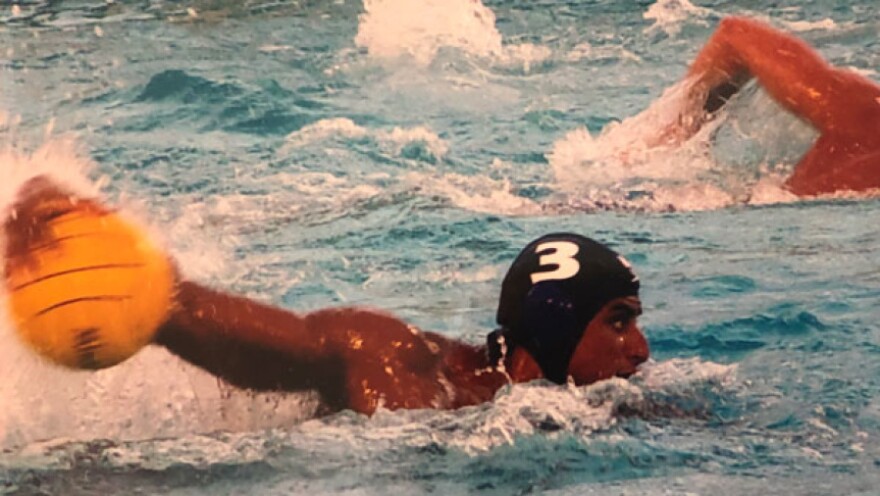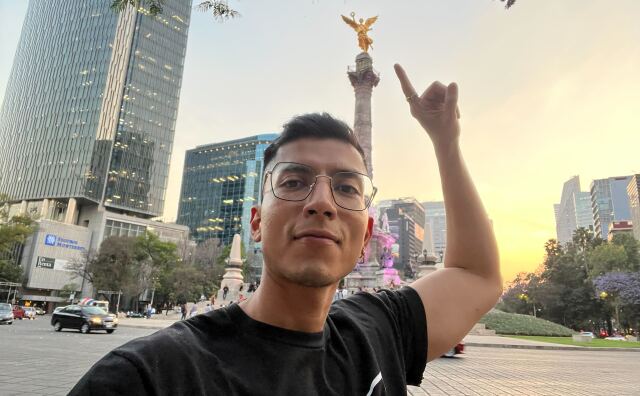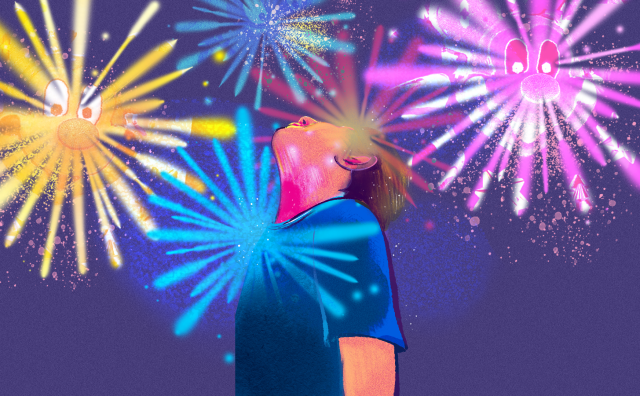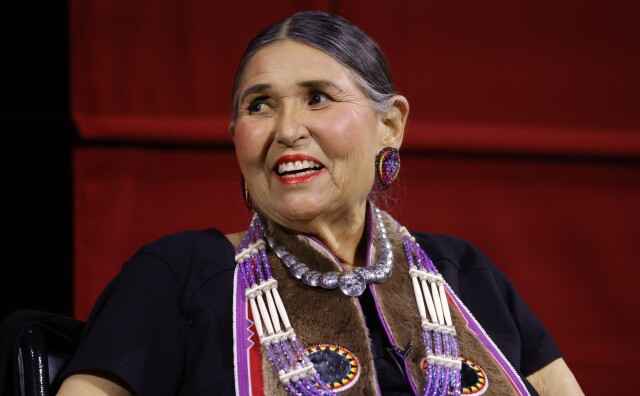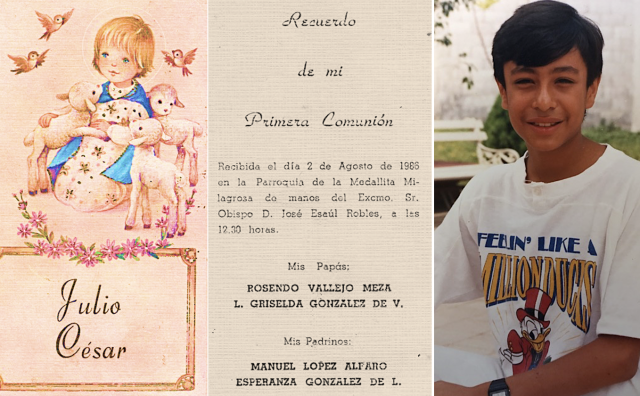"Just put your hands on the dashboard and calmly do whatever they ask you to do."
That was what my father taught me first when I was learning to drive, before he had even taught me to actually drive. At the time, I thought that was what everyone was taught -- that it was normal.
-
From June 2020 to July 2021, we published your stories each week to continue important conversations about race/ethnicity, identity and how both affect our lived experiences. We now have a new series Being American, which is again soliciting your essays.
-
Read:
A few years later, I was driving with one of my college friends. We saw the lights flashing behind us and pulled over to the side of the road. I immediately did what my father told me to do, but began to panic upon watching my friend casually exit our vehicle and start talking to the officer.
I thought the officer was either going to pull out his gun or throw him in handcuffs, but none of that happened...because my friend was white.
Following my friend's lead, I opened my door. Before I could even get my feet on the ground, the cop with his hand on his gun yelled to me, "Get back in the f***ing vehicle!"
It was then that I realized what I had been taught was not normal for everyone -- at least not for white people.

WRONG SKIN, WRONG RELIGION
As the son of Egyptian immigrants, I'm technically African American, though I've never considered myself a part of the Black community. Yet, thanks to my curly hair and dark skin, I'm often mistaken for Black. Like the rules my father tried to instill in me during that driving lesson, I quickly learned that with Black skin comes a different kind of experience with society.
Though I didn't understand it at the time, my first memorable experience with racism in law enforcement happened when I was 12. A cop pointed his gun at my mother and me over a parking violation. My father came out of our apartment just in time to hear the officer call her a "bitch n*gger." My father immediately stood in front of us, blocking me from view, and instructed the officer to point the gun at him instead.
What my 12-year-old brain gleaned from that experience was, "My dad is a superhero and police officers are dangerous."
In theory, police officers are supposed to be our real-life superheroes, coming to save the day and help us when we need it. Unfortunately, members of the BIPOC community have been conditioned to fear law enforcement. They are supposed to "serve and protect" us, but how can they do that when they perceive our skin color as a threat?
I grew up in East L.A. in the 1980s. The differences in my complexion and religion made me the target of racial slurs on a daily basis and beatdowns by white kids for no reason than I was "other." Sadly, the poor treatment I received wasn't limited to my peers.
In elementary school, I had a teacher tell my parents I needed to be held back because I was a "bad student." Admittedly, I had trouble paying attention and was a little overactive, but for white students they called that ADHD, not "bad." Luckily, my mother insisted that I would be fine, and I was not held back.
My practice of Islam was also a problem for my teachers in grade school. My first grade sat me down and told me that being Muslim meant that I was going to hell and that I should convert. There were times that I was pulled out of class and forced to sit in a Bible studies truck which wasn't part of the school curriculum, but parked on our campus sometimes. Here, I was told being Muslim was "evil."
TROUBLE IN THE WATER
Growing up, I excelled in a predominantly white, notoriously non-inclusive sport: water polo. I was strong in the water, and fast. When it came time for college, I was recruited by Division I universities in both water polo and swimming.
I ended up at UC Irvine, playing for one of the winningest coaches in the history of water polo. A number of his players over the years had gone to the Olympics, and I had my sights set on becoming one of them.
Competing in a collegiate pool, I hoped things would be different than my formative years in school. Water polo is a tough, physically-aggressive sport, as fast-paced as basketball except in the water. I hoped my skin color and religion would matter less than my ability to score goals.
But at a tournament early in my college career, a player on an opposing team told my Black teammate he was going to "make his Black ass bleed Black blood."

At another tournament, an opponent called me a "n*gger" loudly enough for the coaches and officials to hear. Rather than penalizing the player who'd used the slur, the official took me out of the game so that, as he told my coach, I wouldn't retaliate. The other player was allowed to stay in the game.
Undeterred, I dedicated myself to both my sport and my academics. My grades were consistently at the top of my class, and I had my sights set on becoming a doctor. At the end of college, I was invited to join the U.S. National Water Polo Team.
The decision was easy: delay medical school in order to vie for a chance to play in the 2000 Olympic Games in Sydney, Australia. I had been admitted to Harvard Medical School but had convinced the dean to let me defer so I could focus on training. My lifelong dream of becoming an Olympian was so close I could almost taste it.
MORE FROM OUR RACE IN LA SERIES
- A Baby Boomer's Recollection of Systemic Racism And The Police
- Rising Above: How I Found My Voice To Push Back Against Stereotypes, At Work And In Life
- Reading About Anthony McClain Felt Like Reading My Own Obituary
- 'Who Invited Miami?': An LA Transplant On The Rules of Racial Division -- And How We Can Bend Them
- No Soy de Aquí, Ni de Allá (Not From Here, Not From There)
- 'We Don't Hire Colored Girls': After A Job Rejection In 1956, A Young LA Telephone Operator Began Kicking Down Doors
- Dear Racist': How Rage-Writing Turned To Rage-Drawing For An Artist Who's Fed Up With Anti-Asian Hate
- How To Participate In Our Series
My first trip with the National Team took us to Europe. I was 22 years old, the Olympics were two years away and I'd never been to Europe before. Nearly every team meal included pork, which, as a Muslim, I could not eat. When I asked for different food, I was singled out and told it was "this or nothing."
Over the course of the trip, I survived largely on bread and olive oil. I grew increasingly weaker, game after game. The muscle I'd built up over the previous year felt as though it was dissolving. I ended up losing 20 pounds during our five weeks abroad.
Once, when the hunger got the better of me, I snuck out to eat at McDonald's. When a member of the national team staff learned of what I'd done, he benched me. I later emailed him to ask what I could do to make up for my "mistake." I told him I wanted to be considered a part of the team.
Rather than reply or talk to me directly, he read my email aloud to the team. His tone was mocking and resentful. I understood, as I'd had to understand a thousand times before, that he saw me as different from the other members of the team. I'd have to fight twice as hard for my spot on the team. Yet two years later, in 2000, when the Olympic team roster was announced, I wasn't on it. I was one of the last players cut from the team. My Olympic dream, I feared, was finished.

LEARNING TO PERSEVERE
In 2001, I enrolled at Harvard. By that time, I'd recommitted myself to water polo and had decided to try, just one more time, to make the Olympic team. When I was admitted to Harvard, the dean of the medical school and I struck a deal: I'd be allowed to travel for tournaments and train with the National Team, as long as I kept my grades up.
For the next three years, I spent my weekdays studying medicine in Boston and my weekends training in California. I flew to California every Friday, then back to the East Coast on Sunday.
After 9/11, I was "randomly" screened by airport security more times than I can count. I was often detained for days at a time. Once again, my dark skin -- and now, my religion -- was seen as a threat.
I studied in airports, on the plane and in the house where I stayed in Orange County. Meanwhile, back in Massachusetts, I lifted weights after class and swam on my own, most days training until midnight, in order to stay in shape.

The dean of Harvard Medical School left his position during my second year, and one of my professors decided he didn't want to honor the deal that had allowed me to keep training. He repeatedly tried to fail me until, at a certain point, the medical school's ombudsman stepped in. He offered a "revised" plan: In order to pass the class, I'd have to score higher than all of my classmates. That is, I'd have to score an 80% or higher in the class to pass, whereas 60% was considered passing for everyone else.
When I passed with a score above 80, the professor still tried to fail me. This time, I was asked to take an oral exam before a panel of professors. I did my best to answer the questions, though many seemed intended to trip me up. At one point, a member of the panel -- the one woman professor among the men -- intervened to say that she didn't think she could answer the questions. Finally, my professor relented; I was given a passing grade. Even then, however, a number of my professors told me that if I wasn't going to be 100% committed to medical school, I should quit.

MARKETING MY OLYMPIC DREAM
Nevertheless, I persisted. In 2004, I earned a place on the Olympic Water Polo Team. I arrived in my Team USA apparel, beside my friend and teammate, Genai Kerr. Genai and I had been teammates at UC Irvine and had bonded over being called the n-word by coaches, opposing teams and officials.
Now, we were the first African American men to play for the U.S. Olympic Water Polo Team -- which the team made sure to publicize at every opportunity, despite the fact that we'd both had to work twice as hard as our white teammates to get playing time while turning a blind eye to the racism we encountered on a daily basis.

When I returned from Athens, Harvard Medical School used my picture for their marketing materials, highlighting my accomplishments as though they'd supported my athletic dreams the entire time. I didn't mind helping to promote the medical school, and sure, it was fun to see my picture on the brochure; what bothered me was the dishonesty of it, the feeling that I was being used.
Had I quit medical school, as many people at Harvard had encouraged me to do, they wouldn't have missed me. Quitting would have only proven that I hadn't belonged in the first place. Now I was hailed as an example. It was classic tokenism, and I felt cheapened by it.
'I AM NOT A THREAT'
As a kid, I constantly tried to hide my culture and nonwhite attributes. It was incredibly frustrating to be treated differently solely because of the color of my skin. Now that I am old enough to understand why it was happening, I am not only frustrated, I am outraged.
Even now, in my mid-forties and 14 years into practicing medicine, I am often mistaken for a nurse because patients, even in a region as diverse as Southern California, can't believe that someone who looks like me could become a doctor.

And neither the M.D. behind my name nor my status as an Olympian assures that I'll be treated equally. My education and my accomplishments become irrelevant whenever I'm pulled over by the police. It is still my instinct to place my hands on the dashboard, as my father taught me to do so many years ago. It has kept me alive.
My family members with dark-skinned children tell me how much they fear for their children's lives. This is the poison of institutional racism: the subtle and insidious notion that people of color feel that they can never do enough, never accomplish enough, never earn or learn enough, to overcome the knee-jerk judgments of people -- whether they're police officers or Harvard professors -- who insist on seeing us as a threat.
I am not a threat. I marched in American red, white and blue -- representing the same country we all call home -- at the Olympics' closing ceremonies in Greece. I'm the emergency room doctor who might just save your life, or the life of your loved one, someday. I'm a dark-skinned, curly-haired, Southern Californian. I'm an American. And yet, I have so often felt alone in my sport and in my career.

For many years, I thought I was the only one who felt this way, that loneliness and exclusion were the prices I needed to pay to succeed in water polo and medicine. I've come to understand that these feelings are actually recurring themes for many Blacks and other people of color, including many who have competed in sports at the highest level. It doesn't have to be this way; we have the ability to treat one another better, with compassion and understanding. We have the power to heal ourselves from the poisons of racism.
I probably will not see true equality between races in my lifetime, but I hope that "normal" for Black and Brown people can become more like the white "normal." I hope I never have to teach my children to put their hands on the dashboard when being pulled over. I hope I never have to watch another athlete endure what I have experienced.
I do not expect to change the minds of overt racists, but if people who read this begin to recognize their privilege and covert racism in thoughts and deeds, then sharing my experiences will have been worth it.
I forego being anonymous to encourage others to feel safe in sharing their stories. It's my hope that others will recognize themselves in my story, will see their own ambitions and dreams, and will do their part to create lasting change, for all of us.
ABOUT THE AUTHOR:
Dr. Omar Amr is a Harvard-educated emergency medicine physician who has been practicing for 14 years. He is now the ultrasound director of a residency program he helped start at St. Joseph's Medical Center in Stockton. While attending Harvard Medical School, he also competed in the 2004 Olympics for Team USA. Most recently, he founded the Alliance for Diversity and Equity in Water Polo. The ADEWP fights for equal opportunities for BIPOC athletes and works to prevent discrimination and promote inclusion within the sport.


